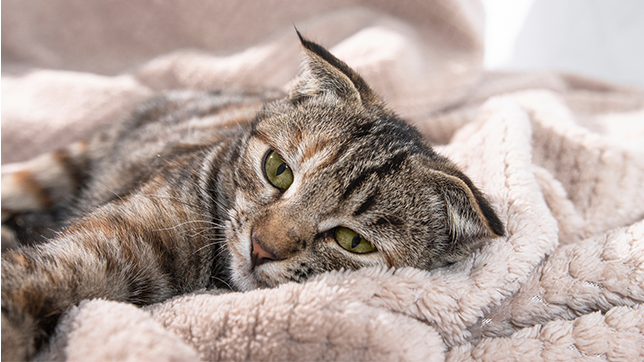6th October 2023
Vomiting in cats

Vomiting in cats is a common occurrence that can be quite worrying for pet owners. While the occasional vomit may not be a cause for concern, chronic or severe vomiting can be a symptom of many different health conditions that require veterinary attention and treatment.
It’s important to understand the causes and recognise the symptoms for vomiting, as well as the ways we can prevent our feline friends from throwing up.
Causes of vomiting in cats
There are a lot of reasons why a cat might vomit. Common causes include:
- Eating too fast or too much: Slowing feeding down with smaller meals spaced throughout the day, or using slow feeder bowls, may help prevent your cat from swallowing air with their food.
- Food allergies: Intolerances or allergies to certain ingredients in their diet can trigger vomiting.
- Diet change: New food, certain treats, scavenging, and hunting can cause a stomach upset in cats.
- Frequent grooming: Cats love to groom, and the ingestion of loose hair can lead to the formation of hairballs in the stomach, causing vomiting.
- Ingested objects or toxins: Cats may ingest foreign objects such as toys, string, plants, or chemicals that can irritate the stomach lining and induce vomiting.
- Inflammatory Bowel Disease (IBD): A chronic condition where the digestive tract becomes inflamed, leading to recurrent vomiting and other symptoms.
- Parasites: Intestinal parasites like worms can cause gastrointestinal upset, including vomiting.
- Emotional stress: Our feline friends can be sensitive creatures, and stressors like moving to a new home, changes in routine, or the presence of other animals can trigger such reactions.
- Other conditions: Conditions like gastritis (inflammation of the lining of the stomach), pancreatitis (swelling of the pancreas) or cancer can cause vomiting in cats.
How to know if a cat is feeling unwell
If your cat is feeling sick and is likely to throw up, they might show signs like:
- Licking their lips.
- Excessive swallowing.
- Drooling.
- Eating grass.
- Eating less than usual.
- Retching.
What to do if your cat is vomiting
Since most cats vomit occasionally, it may not be necessary to see your vet each time. However, frequent or severe vomiting is not normal, so it’s important to keep a close eye on your feline in case things worsen.
Contact your vet if they show any of the following symptoms:
- Repeated vomiting.
- Blood in their vomit.
- Pain or distress.
- Pale gums.
- Diarrhoea.
- Weakness or lack of energy.
If in doubt, Animal Friends (dog or cat) policyholders can access free vet video consults 24/7 with Joii Pet Care.
Preventing vomiting in cats
While some cases of vomiting should be diagnosed and treated by your vet, many instances of cat vomiting can be prevented. Try these measures to keep your feline’s stomach happy and healthy:
- Regular grooming: Brush your cat regularly to help reduce the amount of loose hair they ingest and minimise the number of hairballs your cat throws up.
- Enrichment feeders: If your cat eats too quickly, why not consider getting a slow feeder which can help encourage slower digestion and help your cat to keep their meal in their stomach?
- Food choices: Always try to choose a well-balanced, high-quality diet for your cat to ensure that you meet their individual nutritional needs. Avoid sudden dietary changes and always transition between foods gradually if necessary.
- Grass is good: Grass can help a cat’s digestion, resulting in fewer hair balls and less constipation.
- Monitor playtime: Keep an eye on your cat during playtime to prevent them from ingesting small objects that could cause vomiting and other difficulties.
- Keep them safe: Always store any household chemicals and medications securely to prevent accidental ingestion. Try not to have any poisonous plants in the house or garden.
- Regular veterinary checkups: Schedule regular checkups with your vet so that you can catch and address any health issues early.
By providing a well-balanced diet, a stress-free environment, and regular veterinary checkups, you can ensure a better quality of life for your cat.
Looking for more cat advice?
We’ve written some handy cat advice guides, to help you unlock the secrets of your mysterious moggy.
Need cat insurance?
Cat insurance can help cover the cost of veterinary treatment if your cat gets injured or falls ill.
We know pets
Our pets are part of the family. To achieve our vision of a better future for pets everywhere, we work with our partners, vets, and other veterinary professionals who are pioneering the latest advancements in animal care. Our campaigns, articles, and events are crafted to support, educate, and celebrate pet owners, while our policies are designed to provide peace of mind at an affordable price.
Yet our policies don’t just protect against the unexpected – they have purpose, too.
Since we were founded over 25 years ago, we've provided industry-leading policies that protect the nation’s pets, while also making a difference to animal welfare and our planet. Thanks to you, our policyholders, we've donated over £9 million to more than 830 animal welfare charities and conservancies, helping to support vulnerable pets and wildlife around the world.
We’re proud to be wildly different. Are you?
